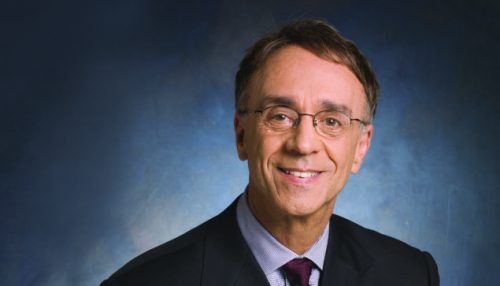My Three Cents

Ken Makovsky
Wednesday, August 29, 2018What it takes to be a “Breakaway” CEO
Last month in My Three Cents, I focused on the characteristics of “breakaway companies” – outstanding organizations built on a passion for growing their businesses by developing talent, innovating continuously, and disrupting industry. This was the topic of a video interview I did with Bloomberg’s CEO Council.
This month I want to touch on the “breakaway CEO,” specifically some of the qualities or philosophies exceptional leaders bring that separate an organization from the pack.
Having worked with companies throughout my career — from global behemoths to aspiring entrepreneurs, across a wide array of industries — I’ve observed abundant differences among CEOs who I would identify as “breakaway.” They are not all necessarily tech geniuses! You will find both extraverts and introverts among them. McKinsey has written that “exceptional” CEOs are twice as likely to have been hired from outside the company, but I have worked with many who spent most of their time in one organization.
The “special something” a breakaway CEO brings can be the ability to inspire others. Or recognizing the potential of an acquisition or change of plan. Or simply good judgment in hiring the right number two.
But from my vantage point as a communications strategist, what makes a CEO “breakaway” can be something more basic and essential:
-
- “ESTABLISH A DISTINGUISHING VISION OR STRATEGY – AND IMPLEMENT IT WELL.” The ability to be forward-looking – to create and execute an exciting vision or strategy that others can buy into — is a rare trait that separates leaders from managers. So found a study of tens of thousands of workers around the world, published almost a decade ago in Harvard Business Review. But to be clear, having the vision or strategy is not enough! Flawless implementation is the other part of the breakaway equation. CEOs fail more because of implementation errors, according to Fortune.
-
- “EXPECT THE UNEXPECTED.” The economy can go haywire. Your product or service can have a defect. A cybersecurity breach can crater the bottom line. The weather can impact your sales program. An ethics problem could emerge. A sexual harassment issue might impact your reputation. The solution? Breakaway CEOs make sure they are prepared with plans to address all potential mishaps to shorten the possible economic discomfort when the unexpected occurs.
It may sound surprising how many companies/leaders fall short today in this critical area. For example, a 2018 study by Deloitte found “dramatic gaps between a company’s confidence that they can respond to crises and its level of preparedness:” While 90% of respondents were confident in their company’s ability to respond, only 17% had actually tested their assumptions. Expecting the unexpected is truly a game-changer.
- “EXPECT THE UNEXPECTED.” The economy can go haywire. Your product or service can have a defect. A cybersecurity breach can crater the bottom line. The weather can impact your sales program. An ethics problem could emerge. A sexual harassment issue might impact your reputation. The solution? Breakaway CEOs make sure they are prepared with plans to address all potential mishaps to shorten the possible economic discomfort when the unexpected occurs.
-
- “TAKE CALCULATED RISKS.” To be a breakthrough CEO, one must be open to taking calculated risks – and to not be afraid of failure. In an interesting report, Entrepreneur noted that mega-companies including Amazon, Coca-Cola and Netflix are signature examples of organizations that are encouraging employees to take “more calculated risks and not let fear of failure hold them back.” Universities are also taking this on. Smith College in Western Massachusetts introduced a “Failing Well” program to teach high-achieving students to overcome setbacks.
-
- “LISTEN TO THE UPCOMING GENERATION.” They are the future, and they are changing it. If you are not always preparing for the next wave, you are bound to miss it.
For example, if you have been paying attention to the news, you’ll know that millennials, now aged 22-37 according to Pew Research, are about to be nudged out of their position of being the largest segment in the U.S. workforce. Recent analysis by Bloomberg, based on United Nations population data, predicts Generation Z (said to be born after 1996 although definitions vary) will surpass the population of Millennials for the first time by 2019. Gen Z will account for 32% (2.47 billion people) of the world’s population, will soon dominate the workforce and have a very different world view than Millennials. It is incumbent on leadership to be ready to work with them.
- “LISTEN TO THE UPCOMING GENERATION.” They are the future, and they are changing it. If you are not always preparing for the next wave, you are bound to miss it.
-
- “VACATIONS – MORE IMPORTANT THAN EVER.” Nothing refreshes my passion for work more than a vacation. Everybody needs one. Lock up your iPhone in your personal safe and don’t look at it again until you return.This isn’t just my recommendation. Forbes vehemently agrees with me, having run articles at least twice in the past few years extolling the positive impact for CEOs taking a break and cutting off communications with the office. As one CEO wrote, “If you’ve done your job right, you’ve hired the right senior leaders and given them the direction and resources to do that work well. If you didn’t do that by the time you got on the plane for your vacation, a few emails from the beach or the links won’t do the trick.”










